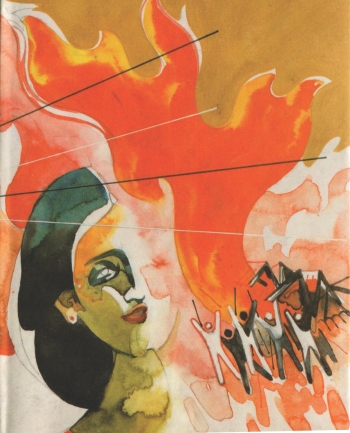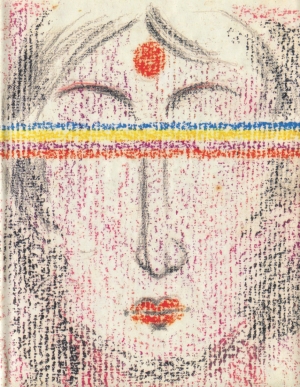| Home - Back Issues - The Team - Contact Us |
 |
| Volume 11 |Issue 02| January 13, 2012 | |
|
|
Remembrance The Unsung Heroine Dr Mahmud Nurul Momen
You can’t tag me as a religious person, but still, I often visit the Banani graveyard to pay homage to the deceased members of my family. The frequency of these visits vary from two to four times a month, although this rule doesn't apply when I'm out of the city. You can very well conclude from my previous lines that these visits of mine are not for the salvation of those departed souls. The visits are meant to prove my love and remembrance for them to myself rather than the salvation. For I believe that in this increasingly mundane and evil society, it's we, the living, who are in need of salvation, more than our beloved ones who have already left us. Never on these visits, for the last twenty years (since my father passed away in 1990), have I spent a reasonable time beside any grave other than that of my blood relatives. The only exception was last Tuesday, the 3rd of January. On that day, my conscience dragged me towards a new name on my visiting list. It was a new grave which was dug and made only four days earlier during which I was present. The grave that that of a great intellectual: Razia Khan Amin. But then again, who says that she was any less than a blood relative to me. I had the privilege of being introduced to a personality of her stature at the tender age of only seven. It was at the time when my dad retired from the University of Dhaka and moved to his newly built house in Gulshan. It was not the Gulshan of today. The maximum height of any building back then, was only two storeys; even the markets and the commercial buildings. So it was a horizontal Gulshan, rather than the vertical one of today. There was plenty of greenery. One such adorable residence with lush greenery was the 'Dakshinayan’ (The portal of the south), the home of Razia Khan Amin. I went with my father, Natyaguru Nurul Momen clasping his hand, to visit a dear student of his next door, Razia Khan. He announced to his student, “I have become your neighbour.” She seemed very pleased by the news. That was the first time I saw her. As time passed I came to know the greatness, the compelling literary information and the enormous intellectual knowledge she possessed. I am sorry to say, Bangladesh is a land of mediocre talents. Here, the true geniuses are not understood even by the elites, let alone the masses. In Bangladesh, not only in the field of literature and arts, in politics, in sciences and in every field of the society, the true honest luminaries don't get the respect they deserve. Or else, how can 'B' grade movie actresses get headlined coverage in the media, while one of the foremost author, educator and intellectual of the land, fade away virtually unnoticed. The connoisseurs of literature and academia know what huge contributions she had made in the fields of literature and teaching. But the only thing I want to mention is that, she was a pioneer in several fields.
She was one of the first actresses of Bangladesh to hit the stages of Dhaka University. In the early 1950's she was one of the first female actors to act on the stage of Curzon Hall in Nurul Momen's plays 'Underneath the Law' and 'Ainer Ontoraley'. After that she acted as 'Malinee' in Sharatchandra's 'Beejoya'. Then she again acted in Momen's 'Is Law an Ass?' and 'At the Altar of the Law'. Before that era female roles in plays were acted by males. She was a pioneer female playwright of Bangladesh, getting awarded for her plays in the early 1950's. After Nurul Momen, she was the first dramatist to win international recognition. She got one of the most prestigious international awards for literature in those days bagging the 'P.E.N. Drama Award' in 1955. It must be kept in mind that apart from Nurul Momen, no other male playwright gained such prominence back then. She was also one of the first modern novelists of Bangladesh, ushering in modernism rather like the French 'avant guard' novels or cinema of that time. Her pioneering novel 'Bottolar Uponyash' in 1958 was a strong slap in the face of conservative society which was prevalent then. It was a strong proponent of women's liberation. Her other works also followed suit in that direction. Unlike most of her contemporaries, she was very impressive and perfect in her English pronunciations. That's why, Nurul Momen preferred her for acting in his English plays. The greatness of the greats is evident in their humility. Razia Khan was always grateful to her mentor and teacher Nurul Momen. This attitude was apparent in her devotion towards him. After the demise of the Natyaguru,, Bangladesh Shilpokola Academy invited her many times to their annual memorial programs, commemorating Nurul Momen’s death anniversaries. She never failed to attend them despite her busy schedule or ill-health. The only time she declined was on the 103rd birth anniversary of the playwright, due to health issues. . The death of the ‘unsung heroine’ united her with her mentor after an expanse of twenty-one years, at Banani; they have become “Neighbours” once again. The writer is the President of Aurony Mohona International Foundation.
Copyright
(R) thedailystar.net 2012 |
||||

